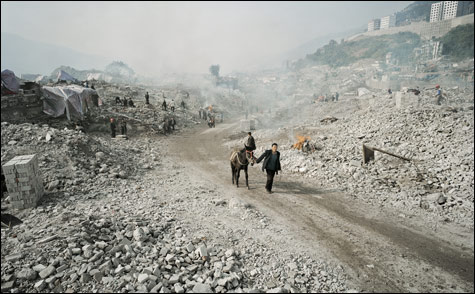
MANUFACTURED LANDSCAPES: A slow trip through China’s billion-person makeover. |
Feeling self-righteous about having recycled your dinosaur computer? The dismaying reality is that it probably ended up in rural China, where the local poor pulled it apart. Then toxic gasses seeped into the ground and into the rivers, making the citizenry sick and the water undrinkable. Edward Burtynsky has photographed the Chinese computer-part mountains, just one example of nature transformed by monstrous industry, and his large-scale work is the subject of Jennifer Baichwal’s disturbing documentary, MANUFACTURED LANDSCAPES, which is getting a fat handful of screenings at the MFA (June 22-24 + 28-30; July 1).
Burtynsky made a detour to Bangladesh to shoot out-of-control oil tankers, but most of the film is a slow trip through China documenting the billion-person makeover from a rural Maoist society into an urban, industrial one. There’s the world’s largest factory, many Wal-Marts long and wide; there’s the Yangtze River project, where cities have been torn down and a million people displaced to make way for a mighty dam. Burtynsky’s photos of all this are somewhat problematic — formally gorgeous renditions of environmental misery and blight that will end up gracing museum walls.
If you visit the MFA this Saturday morning, you can also catch Betsy Bayha’s sweet, irresistible “OUTSIDER: THE LIFE AND ART OF JUDITH SCOTT,” a 25-minute video sit-in with the title fiber artist. Deaf and mute, and locked for three decades in a beastly mental institution, Judy was rescued by her “normal” twin sister, Joyce, who brought her to San Francisco. Judy set up house at Oakland’s Creative Growth Art Center, and over the two decades before her death, in 2005, she blossomed into a fabulous artist, wrapping string around found objects in unthinkably beautiful ways: mini Christo packages, but with cardboard and wood tucked inside instead of the Reichstag. Exhibited in Switzerland and Japan, and with New York Times write-ups, Judy worked on, stopping only for hugs and smiles, and to hoard random magazines. A great video moment: Judy, a Down Syndrome survivor in her 50s, hiding away her new issue of Seventeen.
Over at the Brattle Theatre, Ham Tran’s JOURNEY FROM THE FALL is getting a week starting this Friday, and though this epic based in history is heavy-handed and obvious, it will appeal to those who barely escaped from Vietnam after the Communists’ victory, and also to their American-born relatives. It’s 1975, and South Vietnamese government loyalist Long (Long Nguyen) has decided to remain in Saigon. He’s promptly sentenced to years of hard labor in a re-education camp. Meanwhile, his family — wife Mai (Diem Lien), son Lai (Nguyen Thai Nguyen) and mother Ba Noi (Kieu Chinh) — are attempting to flee to America. The film cross-cuts between De Ban Camp and the boat people. Will Long be able to escape and rejoin his family in the USA?
Journey from the Fall is as pro–South Vietnam and anti-Marxist as John Wayne’s The Green Berets. It’s a movie Richard Nixon could have loved — except that here the South Vietnamese curse the US for giving up. “The Americans have abandoned us,” we’re told. “They’ve broken their promise.” Who says there are no parallels to Iraq?